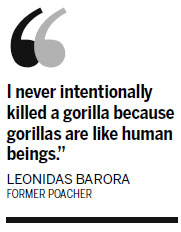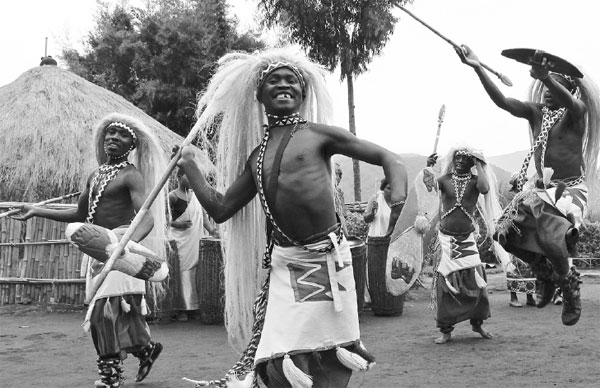Poachers turn gamekeepers in Rwanda
For four decades, Leonidas Barora was a renowned hunter, tracking animals in the lush forests of Rwanda. Now he fires arrows only to impress tourists and help protect the wildlife.
Hundreds of ex-poachers have been persuaded to put down their weapons and support efforts to protect endangered mountain gorillas in Volcanoes National Park, where thick jungle hills are shrouded in mist.
The Virunga mountain range, rising more than 4,500 meters along the remote borders of Rwanda, Uganda and the Democratic Republic of Congo, is the last sanctuary in the world of man's giant cousin, which number now around just 800.
|
Former poachers perform a dance for tourists at Kinigi, northern Rwanda, where illegal wildlife hunters have now formed an association that helps them find new incomes, keeping them out of the Volcanoes National Park, home of the critically endangered mountain gorillas. Stephanie Aglietti / Agence France-Presse |
Made famous by the late US zoologist Dian Fossey - murdered in 1985 by suspected poachers - the park faces the same threats she wrote about over two decades ago in her book Gorillas in the Mist.
Population growth and poverty push people to encroach increasingly deeper into the park to graze their cattle, cut bamboo for building and hunt for food.
For hunters like Barora, now 75, hunting had been the only way to earn a living.
"After killing the animals, I traded the meat in the village for beans or potatoes, I didn't make money," said Barora, after shooting off his deadly arrows at a target, to show visitors his old skills.
"I hunted buffalo, antelope and elephant. ... I never intentionally killed a gorilla because gorillas are like human beings, but I did accidentally kill them in traps I had set."
In the lush highlands of Rwanda's northwest, the "Iby'Iwacu" village - "our heritage" in Kinyarwanda - is a reconstruction of a traditional community where Barora and other ex-poachers now work to guard the wildlife they once hunted.
Income from tourists provides an incentive to protect the gorillas.

Park rangers say the giant apes are not the main targets of poachers, but the gorillas are instead injured - or killed - in the traps that poachers set for other animals for bush meat.
For Barora, his life changed in 2005 after meeting Edwin Sabuhoro, then one of the national park staff.
More to gain
Traumatized by his rescue of a baby gorilla from a poacher, the young man decided he must convince the hunters they had more to gain by protecting the park's wildlife than continuing the killing.
"The poachers were telling me: 'If you lived around the park, your children were hungry, and you know that in the park you could find something to eat, what would you do?'," Sabuhoro told AFP.
So Sabuhoro resigned, bought land at the foot of the mountains, and went to the poachers, pleading for them to join him.
Within six months, 500 poachers had come from the forests to join Sabuhoro at the cultural village, building small round huts with mud walls and a thatched roof, around a replica of a chieftain's hall.
(China Daily 09/18/2014 page11)















